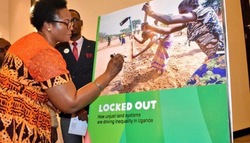
The government has prioritised provision of land to investors, mainly large scale and foreign-based, free of charge or for a nominal sum, under an incorrect assumption that this will result in livelihood improvement for all the people.
Oxfam says government wrong on land
by JULIUS BUSINGE
A new report by Oxfam, the international development and humanitarian organisation, has faulted the government’s land policies.
Titled `Locked out; How unjust land systems are driving inequality in Uganda’, the report re-emphasised dealing with gaps in land access, ownership and management to speed up economic growth and social transformation.
According to the research findings, poor households are continuing to subdivide ancestral lands and individual lands and plots are getting smaller and less productive.
Renowned economist and lecturer at Makerere University Fred Muhumuza and the leader of research and advocacy at the Oxfam Uganda office, Patience Akumu who compiled the report, listed these as major issues.
Speaking at the report launch on Nov.29 in Kampala, Muhumuza and Akumu said other findings according to the report had to do with difficulty of valuing land for compensation, weaknesses regarding dispute resolution mechanisms and the effects of gender and cultural norms.
According to them, national policies have not addressed these issues. Instead, the government’s focus is on economic growth through privatisation of land for big projects.
The government has prioritised provision of land to investors both in rural and urban areas; mainly large scale and foreign-based, free of charge or for a nominal sum. The goal is to operationalise public-private partnerships. They said that the government assumption that this move would result in livelihood improvement for all the people is not largely correct.
“The reality is that fewer jobs than anticipated are created, the displaced people often lack the skills to take them up, and no training in the required skills is made available,” the report reads in part.
They also said that most of the land that the government gives away is under the management of the Uganda Land Commission and District Land Boards which have failed to keep a comprehensive inventory of their land.
They quoted a 2015 report by the auditor general that looked at 211 pieces of government land and found that 19% of them did not have records. Similar gaps, the report says, have been found in land records managed by the DLB.













